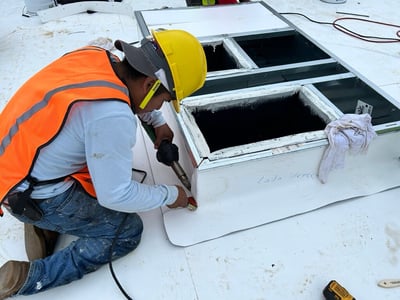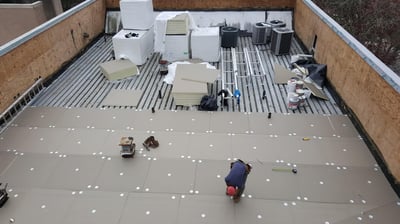
I’ll be honest, repairing a flat roof can be tricky. I know what you’re thinking: that’s so not something you want to hear a roofing contractor say, but it’s true! Tricky however doesn’t equal impossible in this scenario, especially when it comes to TPO and PVC roofing. All it means is that during your project, your roof will be experiencing a little extra TLC. What, acronym overkill?
That being said, if you’re the proud owner of a low slope or flat roof, I'm sorry to say that you’re already at a disadvantage. The water doesn’t drain off of your roof as fast as a steep slope roof. For example, let’s say you spring a leak. With the roof being flat, the water could be coming in from further away than where the leak is showing up on your ceiling, making it harder to detect and repair, even for the experts.
We get your flat roof concerns. RoofCrafters has been repairing and replacing flat roofs for nearly 3 decades. It’s safe to say that we understand a thing or two about TPO and PVC roofing. We also want to make sure commercial property owners are knowledgeable about their roofs before their contractors even show up.
If you’re reading this article, it’s safe to say you’ve had a question or 2 raised about a TPO or PVC roof, and you’re wondering what your options are. It’s a good thing you’re here because, in this article, I’ll be explaining what TPO and PVC roofing are, their pros and cons, and things to consider before choosing the material for your next roof installation. Let’s get started!
What is a TPO Roof?
TPO, or thermoplastic polyolefin, is a single-ply membrane used mainly in commercial roofing (and occasionally residential). It’s white, which reflects heat to keep the roof and building cooler. However, white roofs tend to collect dirt faster, so regular maintenance is key with TPO.
What is a PVC Roof?
PVC (polyvinyl chloride) is another single-ply, white roofing membrane that reflects heat and is widely used in commercial properties. While both TPO and PVC are durable, their main difference lies in their chemical makeup: TPO includes ethylene propylene rubber, while PVC is composed of ethylene and chlorine. This makes PVC more resistant to chemicals, especially grease and animal fats, which is essential for buildings with hood vents, like restaurants or food courts.
Pros & Cons of TPO Roofing
So, how exactly does TPO roofing compare? There are a few differences; Let’s make a pros and cons list to help you better understand the differences.

TPO pros:
- Is environmentally friendly
- Reflective surface reduces UV radiation
- Easy to install and repair
- Energy efficient
TPO cons:
- Less chemical resistant
- Will deteriorate when grease or animal fats contact it
- Higher membrane damage risk
PVC Roofing Pros and Cons
PVC roofing has its upside. It is the most widely used roofing on fast food restaurants and any building that has hood vents that may disperse grease from animal fats.
PVC pros:
- Offers optimal puncture and weathering resistance
- 30-year reputation for durability
- Highly chemical resistant (grease and animal fats)
- Flexible
- Easy installation
PVC cons:
- Plasticizer degradation
- Higher material cost
- Not as environmentally friendly
Things to Consider Before Choosing TPO or PVC
As you can see, the differences between TPO and PVC aren’t all that major, and they both make an excellent option for your flat roofing project. Still, when it comes to deciding between two materials, there are some considerations that you should take into account. To determine which material is the best fit for your project, consider the:
 Labor
Labor- Cost
- Quality
- Efficiency
- Standards
- Durability
Labor
When it comes to the labor aspects of your roofing project, TPO tends to be easier to install due to the speed at which we can weld the seams. It makes it faster to complete the detailed work at drains and thru-wall scuppers. PVC installations oftentimes will require more work because it requires that the installation slow down.
Cost
Cost-wise, PVC is more expensive than TPO per square foot. So, while the material itself varies in cost, the cost of labor during installation is about equal for both materials, though PVC is slightly more labor-intensive.
Quality
Whether you choose TPO or PVC for your roofing project, the quality of either material is one of the most important components. It’s essential to choose an experienced contractor with top-tier warranties if you want the best quality material and the most protection. If your contractor is certified by a top manufacturer, you can rest assured that your installation methods will be stellar, and so will your materials.
Efficiency
PVC and TPO membranes both provide a white, naturally reflective surface that helps to reduce UV rays from penetrating the system, providing you with greater energy efficiency. So, when it comes to efficiency, you’ll be in good hands either way. When contractors use PVC or TPO membranes, the roofing system in question is better protected from debris, too.
Standards
ASTM International, formally known as the American Society for Testing and Materials, regularly updates its standards for TPO roofing. Due to the frequency, some manufacturers may not be current on the most recent standards. This risk is much lower when it comes to PVC because it is an industry-established material. Just be sure to pick a contractor that you trust has a reputable supplier.
Durability
Last but not least is durability. TPO roofs tend to be more durable because they lack plasticizers, unlike PVC roofs. However, commercial buildings with restaurants or fast food that have hood vents must use PVC roofs. PVC roofing can withstand grease and animal fats without failure. At the end of the day, as long as you choose a contractor with experience, there shouldn't be a concern when it comes to the durability of a TPO or a PVC roof.
Which Flat Roof is Best for Me?
They’re both great options for commercial properties and have many different benefits. If you are the proud owner of a commercial property with a restaurant, PVC will be your choice! Now that you’re a little more well-versed with these two acronyms, it’s time to reach out to your local contractor and schedule your inspection.
RoofCrafters works extensively with TPO and PVC roofing and can offer you the top warranties in the industry. Don’t wait any longer, and schedule an inspection with one of our expertly trained estimators.
In the meantime, feel free to check out the extensive resources located in our learning center. I recommend reading, Commercial Roofing - What is an NDL Warranty? Next, you can delve deeper into vetting the roofer best suited for your project.
My name is Mitch, and I have over 10 years of roofing experience. I enjoy my career in the service industry because I love helping others take care of their homes and businesses. With over 10 years in the roofing industry, my success comes from my honesty and integrity during my roof inspections. I do my best to listen to the needs of my clients and strive to provide an awesome client experience.



